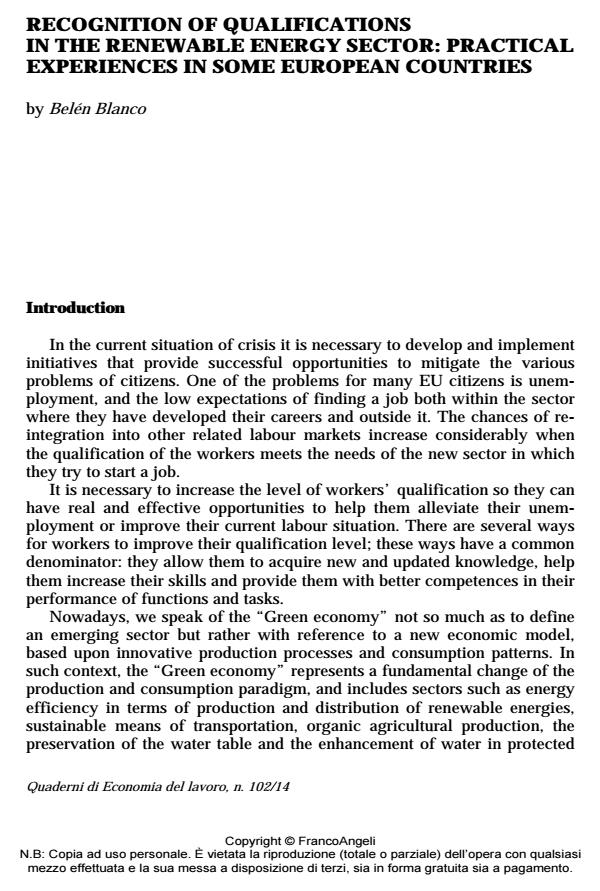Recognition of qualifications in the renewable energy sector: practical experiences in some european countries
Journal title QUADERNI DI ECONOMIA DEL LAVORO
Author/s Bélen Blanco
Publishing Year 2015 Issue 2014/102
Language Italian Pages 23 P. 145-167 File size 89 KB
DOI 10.3280/QUA2014-102011
DOI is like a bar code for intellectual property: to have more infomation
click here
Below, you can see the article first page
If you want to buy this article in PDF format, you can do it, following the instructions to buy download credits

FrancoAngeli is member of Publishers International Linking Association, Inc (PILA), a not-for-profit association which run the CrossRef service enabling links to and from online scholarly content.
- The European Parliament and the Council of the European Union (2013). Regulation (EU) Ng ranges from basic education/training to higher educatprogramme for education, training, youth, sport and repealing Decisions n013). Regulation (EU) Ng ranges from basic education/training to higher education. In this co
- The Council of the European Union (2012). repealing Decisions n013). Regulation (EU) Ng ranges formal learningation/training to higher educatprogramme for education.
- The Council of the European Union (2011). Council conclusions of the modernization of higher education.
- The Council of the European Union (2011). Council conclusions on the role of education and training in the implementation of the Europe 2020 Strategy. EDU 11, SOC 38 (5505/11).
- The European Parliament and the Council of the European Union (2009). Directive 2009/208/EC on the promotion of the use of energy from renewable sources and amending and subsequently repealing Directives 2001/77/EC and 2003/30/EC. Official Journal of the European Union.
- CEDEFOP (2009). The dynamics of qualifications: defining and renewing occupational and educational standards. Luxembourg: Official Publications of the European Communities.
- CEDEFOP (2009). European guidelines for validating non-formal and informal learning. Luxembourg: Official Publications of the European Communities.
- The Council of the European Union (2009). Council conclusion on a strategic framework for European cooperation in education and training (ET2020). Official Journal 2009/C 119/02.
- European Commission (2008). Union (2009). Council conclusion on a strategiork for Lifelong Learningcooperation in education and training (ET2020). Official Journal 2009/C 119/0.
- The European Parliament (2008). n (2009). Council conclusion on a strategiork for Lifelong Learningng Learning (2009). Council conclusion on a strategiork for Lifelong Learning009/ C 119/0 in education.
- The European Parliament and the Council of the European Union (2008). Decision nr Lifelong Learning Official Journal C 111. and training (ET2020). Offt fprogramme in the field of lifelong learning. Official Journal of the EU (30-12-2008)
- The European Parliament and the Council of the European Union (2006). Decision nr Lifelong LearningOfficial Journal C 111. and trainiPublicationsfelong learning. Official
- Journal of the EU (24-11-2006). The European Parliament and the Council of the European Union (2004). Decision nr Lifelong
- LearningOfficial Journal C 111. and trainiPublicationsfelong learning. Official Journal of the EU (24-11s (Europass). Official Journal of the EU (31/12/2004
- Renewed skills Project (2013). Future needs of the labour market in this sector.planning ranges from basic educProcesy, bfw, Qbit, FITAG-UGT and IFES. www.reskill.org.
Bélen Blanco, Recognition of qualifications in the renewable energy sector: practical experiences in some european countries in "QUADERNI DI ECONOMIA DEL LAVORO" 102/2014, pp 145-167, DOI: 10.3280/QUA2014-102011